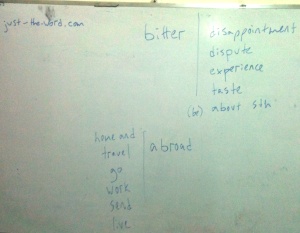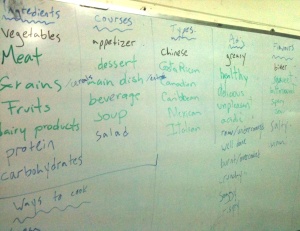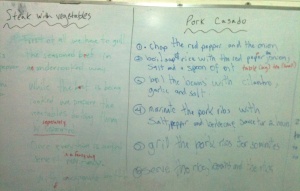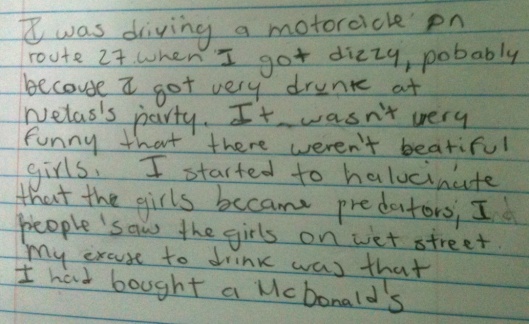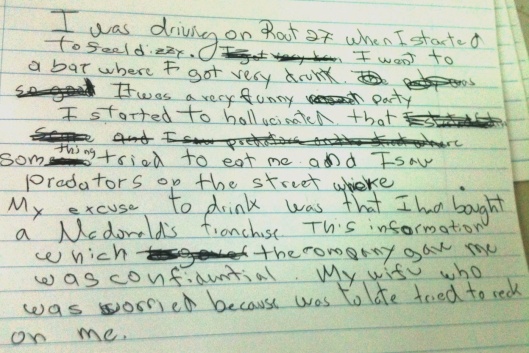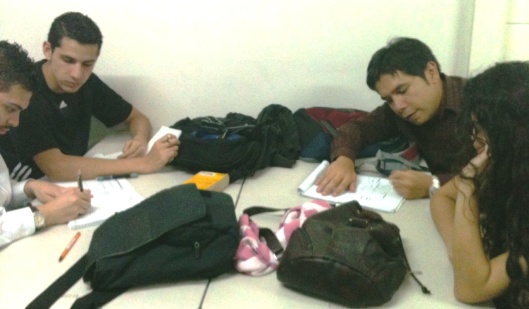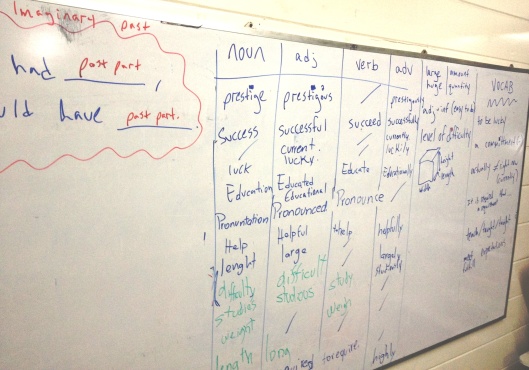This class was all about accents. There’s a number of different examples of these floating about the class, given that Ben’s Canadian, I’m Scottish and the group are Costa Ricans. Such exposure surely can’t be a bad thing.
Accentuate the difficulties
I actually can’t remember how the topic came up now, as my notes are not the most complete from this class. That said, I do know that they started talking about my accent versus the much more predominant US version in this part of the world. Well, I say US version, I don’t think I’ve met two Americans here with the same accent, but they all seem to get lumped together as US, in the same was that someone from Newcastle and London have a British accent (I, oddly, don’t, having it would seem, a Scottish accent, but I digress..).
And so the discussion continued, with the differences between the various English accents the group is familiar with being expanded and commented upon. You’ll be glad to know that ‘the Scottish accent’ is seemingly quite easy to follow, which I’ll take as a compliment to my language grading, as most native speakers tend to tell you otherwise (though that’s another debate about greater cultural issues). From here, I then asked the group to think about Costa Rica and decide upon the most difficult accents here. As usual, the Caribbean was highlighted as being particularly tricky.
But where are all the comparatives?
It would seem natural in a discussion comparing different things to use some language for comparison. Given that this wasn’t happening, I went for this as the emergent language. Indeed, in the whole discussion, the only attempted comparative structure was “they are closer to the border, they speak more Nicaraguan“, which certainly conveys the intended meaning, but not exactly 100% naturally. At this point, just as I was about to go over some lexical phrases for comparing, Freddy asked for clarification of the pattern of 2+ syllables taking “more”, while 1 syllable adjectives take “-er” when forming comparatives. We quickly went over this, as they seemed to know it, and discussed less clear-cut examples such as “fun” (it seems to get treated as a noun) and “handsome”, which someone pointed out seems to go both ways. I thus felt justified in my selection of comparatives as the emergent language and went on to present other ways of comparing.
When I work on comparative forms, I usually do it by sorting them into “a big difference”, “no difference” and “a small difference” with one or two other bits and pieces thrown in. We ended up with (there were accompanying examples but I don’t have a photo for this class):
A big difference + [comparative form]
- considerably
- a lot
- a great deal
- way
No difference
- as [adjective] as
- no [comparative form] than
A small difference + [comparative form]
- slightly
- a little
- a bit
- a little bit
We also went over sentence stress and register too and added further examples using the accents context established earlier and through reformulating some of their ideas at the board.
You should know this already, it’s in the pre-int book
Interestingly, for a group who’d you think would’ve had few problems with this area, they were unable to provide any modifying forms at all, such as “a little”, “a lot”, etc. This is one aspect of teaching where Dogme really comes into its own in my opinion. The group would probably have tested at an intermediate or lower upper int level and be working with a textbook which would more than likely assume they knew such forms already. Well, they didn’t. Hence, expanding their range meant starting from there and then building. This is what emerged from the class and with no assumption on my part of any prior knowledge they ‘should have’ had. The focus on emergent language was thus specific to this group with their needs at that time and was, to my mind, more useful for them. Oh, grammar McNuggets, wherefore art thou?
Time to have heated a debate
To practise the structures, I asked the group to do 2 different activities
The first: write 5 sentences about different accents using the new language that they felt least sure of. They then had to read each their sentences to the group and justify them, with the others able to debate them using a comparative structure in some way.
The second is a bit more difficult
- With strips of paper, each person writes two things to compare, one on the left, one on the right, such as “Men / Women” or “Costa Rica / USA”.
- I take the strips and distribute them randomly, with each person having to argue that what they get is better in some way. Thus, if you get “men” and you’re a woman, you still have to argue that men are better in some way.
- I go over some simple and slightly exaggerated lexical phrases for refuting what’s been said, such as “you must be joking!” or “no way!”.
- The debates begin. Each time an appropriate comparative is used, I give it a tick at the board. When we get to, say, 5 ticks, that piece can’t be used again.
- When it seems a group has exhausted their debate, I give them another card to start again with.
This activity is always quite engaging and can really work well with the right group, though it can difficult and requires some imagination. Some groups just don’t go for it, but if you know your class you can get a feel for what they like and I think this class appreciated the challenge and we ended up spending about 20mins on it. There then followed some delayed error correction and clarification, and that was that. Home time, or in my case off to the pub for a ceviche and a chat, but it’s all ultimately the same thing..


